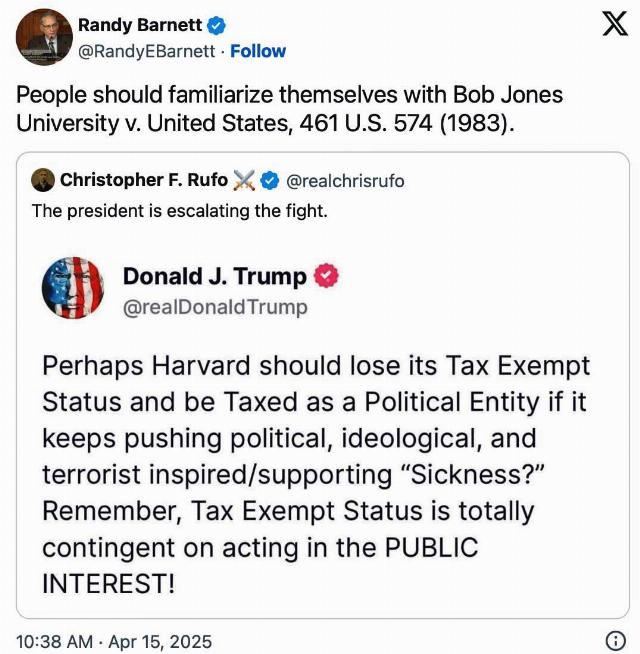Harvard elitism meets Donald Trump
Oil was found on a Wyoming rancher’s land. An instant billionaire, he enrolled at Harvard. Walking across the campus one day he stopped a young student: “Hey there partner, can you tell me where the library’s at?”
The kid elevated his nose and sneered: “heah at Hahvahd, we do not end our sentences with prepositions.”
The rancher smiled and replied: “well OK then. Can you tell me where the library’s at, ass***e?”
Founded in 1636, named for a Puritan minister and originally intended to educate clergy, Harvard is America’s oldest university. It has long traded on a tradition of educational excellence and accomplishment, and for much of America’s history, a Harvard degree was a prestigious ticket to power and success.
That hasn’t been true for a long time, and after the October 7th Hamas slaughter in Israel, Harvard has shown its true, historic antisemitic colors. Even before that, Harvard, which had long before become a virulent bastion of leftism, blatantly engaged in racial discrimination in admissions and lost a Supreme Court case aimed at overturning its racism:
The universities’ main response to these criticisms is, essentially, “trust us.” None of the questions recited above need answering, they say, because universities are “owed deference” when using race to benefit some applicants but not others. Brief for University Respondents in No. 21–707, at 39. It is true that our cases have recognized a “tradition of giving a degree of deference to a university’s academic decisions.” Grutter, 539 U. S., at 328. But we have been unmistakably clear that any deference must exist “within constitutionally prescribed limits,” ibid., and that “deference does not imply abandonment or abdication of judicial review,” Miller–El v. Cockrell, 537 U. S. 322, 340 (2003). Universities may define their missions as they see fit. The Constitution defines ours. Courts may not license separating students on the basis of race without an exceedingly persuasive justification that is measurable and concrete enough to permit judicial review. As this Court has repeatedly reaffirmed, “[r]acial classifications are simply too pernicious to permit any but the most exact connection between justification and classification.” Gratz v. Bollinger, 539 U. S. 244, 270 (2003). The programs at issue here do not satisfy that standard.
Whether Harvard has truly reformed its admissions policies remains an open question. It has now refused to stop rampant antisemitism on campus:
Harvard University said it will not comply with demands issued by the Trump administration aimed at curtailing antisemitism on campus, resulting in the White House freezing billions in federal contracts and grants.
“No government — regardless of which party is in power — should dictate what private universities can teach, whom they can admit and hire, and which areas of study and inquiry they can pursue,” the Ivy League school’s president, Alan Garber, wrote in a statement Monday.
Within hours, President Trump, being Donald Trump, froze $2.2 billion in grants and some $60 million in contracts.
It has long been settled law that public or private universities that take the government’s dollar play by the government’s rules. Harvard thinks itself an exception. The Supreme Court’s Bob Jones University case suggests Harvard is mistaken:

Graphic: X Screenshot
A 501(c)(3) entity, Bob Jones’ policy prohibited interracial dating or marriage. The IRS revoked that tax-exempt status and the Supreme Court upheld the IRS ruling:
The IRS’s 1970 interpretation of § 501(c)(3) was correct. It would be wholly incompatible with the concepts underlying tax exemption to grant tax-exempt status to racially discriminatory private educational entities. Whatever may be the rationale for such private schools’ policies, racial discrimination in education is contrary to public policy. Racially discriminatory educational institutions cannot be viewed as conferring a public benefit within the above “charitable” concept or within the congressional intent underlying § 501(c)(3).
One might argue Bob Jones University’s beliefs, no matter how odious, were based on a sincere interpretation of the Bible, but the Supreme Court found that doesn’t exempt them from federal law or the Constitution. Harvard’s beliefs are arguably a secular faith, though a particularly arrogant, elitist one.
Trump isn’t telling Harvard what or how to teach. Harvard’s First Amendment rights aren’t being infringed—individuals have rights--though Harvard is certainly infringing on the rights of disfavored students and applicants. If Harvard wants taxpayer dollars, it must obey federal law and executive orders. No more illegal discrimination and denial of rights. It’s a defining choice.
Investigation will likely reveal Harvard has continued to illegally discriminate in admissions. Harvard is unquestionably refusing to protect Jewish students and is also violating federal law and the Constitution. With any luck, Harvard will soon have to get along without tax exempt status. We’ll see whether that experience will have a salutary effect on Harvard’s preposition mongers.
On a different subject, if you are not already a subscriber, you may not know that we’ve implemented something new: A weekly newsletter with unique content from our editors for subscribers only. These essays alone are worth the cost of the subscription.
Mike McDaniel is a USAF veteran, classically trained musician, Japanese and European fencer, life-long athlete, firearm instructor, retired police officer and high school and college English teacher. He is a published author and blogger. His home blog is Stately McDaniel Manor.





